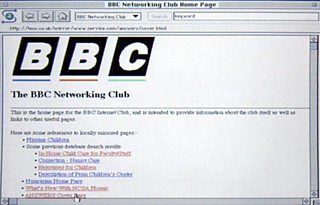Recalling some of �������� Online's history
Lucy Hooberman
Professor, Digital Media and Innovation at the University of Warwick
Tagged with:

The �������� Networking Club's first webpage
��Professor Lucy Hooberman introduced her work with the �������� History Unit compiling the oral histories of those who helped establish what would become ��������'s first online presence.��
In this post, Lucy discusses some of the questions raised in this early phase of her work and points to some early blogs which help document �������� Online's history.��
The tells us that anniversaries should not be wasted and organisations, including the , do seem to love them. But do they get the most out of them and what does that even mean?
Today, Friday 11th April an event in Broadcasting House will mark the 20th anniversary of the �������� on the world wide web - an anniversary stemming from the early work of the ��������'s Networking Club in 1994. I first took the idea of a "big" anniversary to Roly Keating in the summer of 2011 when he was the ��������’s first Director of Archive content. One conversation lead to another and I was introduced to the �������� History Unit and the Oral History Archive. Eventually we agreed the first steps of this oral history and memory project. With a small start (ten oral history interviews), we committed to starting a research stream for the future. But why bother?
Anniversaries are good times to connect to what an organisation is all about in terms of values and mission statement but also to look back at the trends and experiences that bring it to the present. But crucially for organisations that see themselves as innovators these are great occasions to think about the future, to look forward to what is next. I worked at the �������� between 1993 and 2008 during a time of huge change which was social, political and of course technological and whilst many digital types do focus on the technology alone these forces are never standalone.
I had a panic attack last week when the archives went down. Anyone who will understand the feeling of panic if your posts (and your history) disappear. When we started the ��in 2006 part of the reason was to start talking to our audiences directly and more importantly engaging differently. But we were also keen to make visible some of the inner workings and thought processes of the ��������. Not just for the sake of accountability (a good thing), but also being able to talk about what was happening inside the �������� was a big part of it, and by changing the way we talked we also changed some of the culture.
All the posts will be invaluable for media History and other researchers of the present and future.
Take for example. Or, round up of posts from the first ten years (though this date stems from the launch of News Online in 1997). And ’s piece on the ��������’s website archives.��
There are also the memories and experiences of former staff members blogging externally that will go down in history. ’s The ��������’s Fifteen Web Principles��
who was blogging himself long before the �������� started blogging showed many of us what was possible.
And Nick Robinson and Paul Mason literally burst out of the �������� blogging just before we were ready to launch – it really helped actually (thanks to for this archive capture!)
Apart form these public sources what else is there for this “modern period" rom 1994 to 2014? The �������� has an oral history archive started in the 1970s by Frank Gillard and continued to this day. These oral history interviews are subject to a thirty year rule and have interviewed “the great and the good” of the organisation favouring the "great man" view of history which though very popular in the 19th century still seems to hold sway more than you might imagine today.
I personally prefer a Peoples history approach both to my former filmmaking days, and focus on participatory media. Two of my historic guiding lights would be Professor ��and Peter Pagnamanta and his epic Television series the .
So when it comes to organisational memory whose memories get heard? In starting this new research project between Warwick and the �������� I’m lucky enough to be able to build on what we started with the Blog Platform in 2006 and by interviewing people who just worked inside various departments about their work from 1994 onwards. I’m laying down some foundations for researchers of the future, including myself of course.
I thought the ten interviews we have conducted would be the project. But far from it , they are only the beginning as we can now research the rest in detail from the skeletal timeline that has been reconstructed by us real people. My thanks and the ��������’s thanks to Tony Ageh, George Auckland, Lord John Birt, Brandon Butterworth, Bob Eggington, Professor Lizzie Jackson, Matthew Karas, Tom Loosemore, Euan Semple, Chris Westcott and John Birt’s strategy team of 1996 who remarkably came back together for a Witness session. More of that in another blog post. Thank you all for leading the way.
Lucy Hoobeman is Professor of Digital Media & Innovation, WMG, University of Warwick.
- Lucy's introductory post 20 years and Stronger than Ever
- ��@LucyH��on Twitter.��
��
